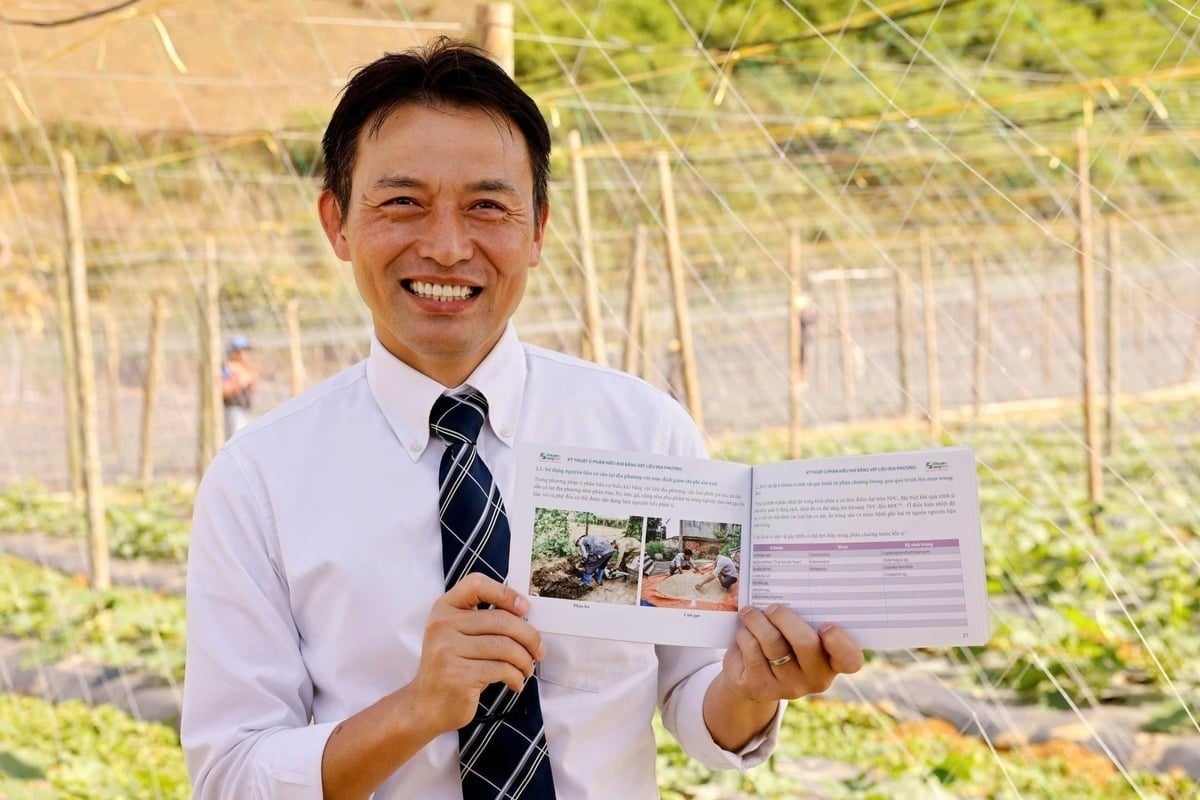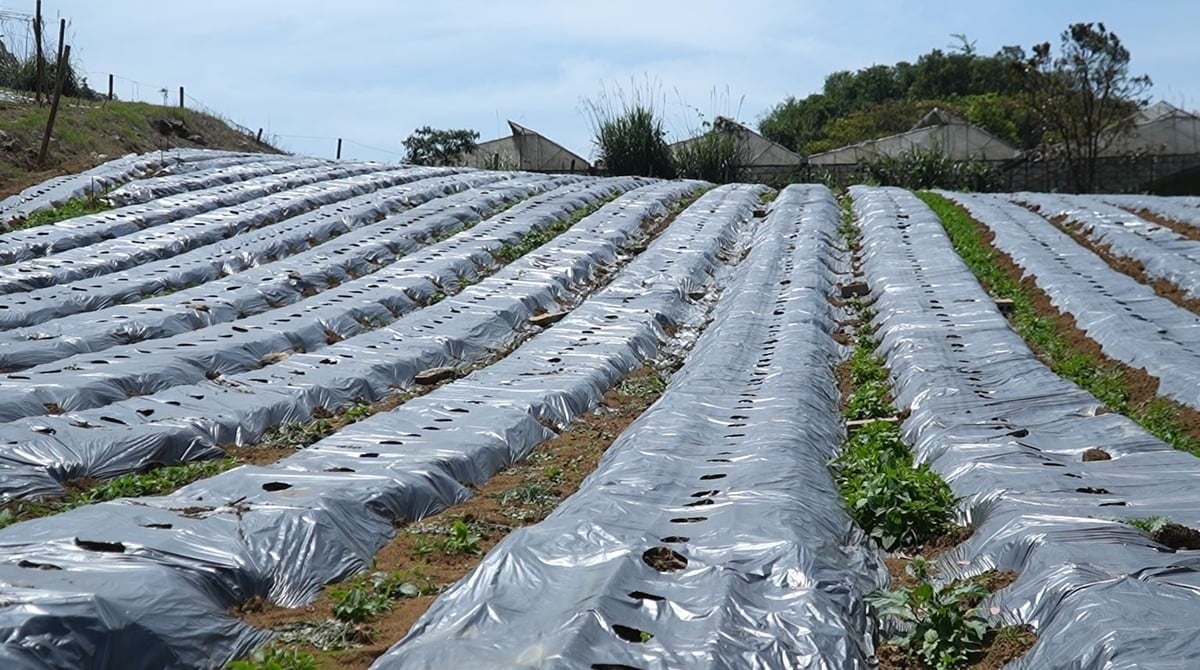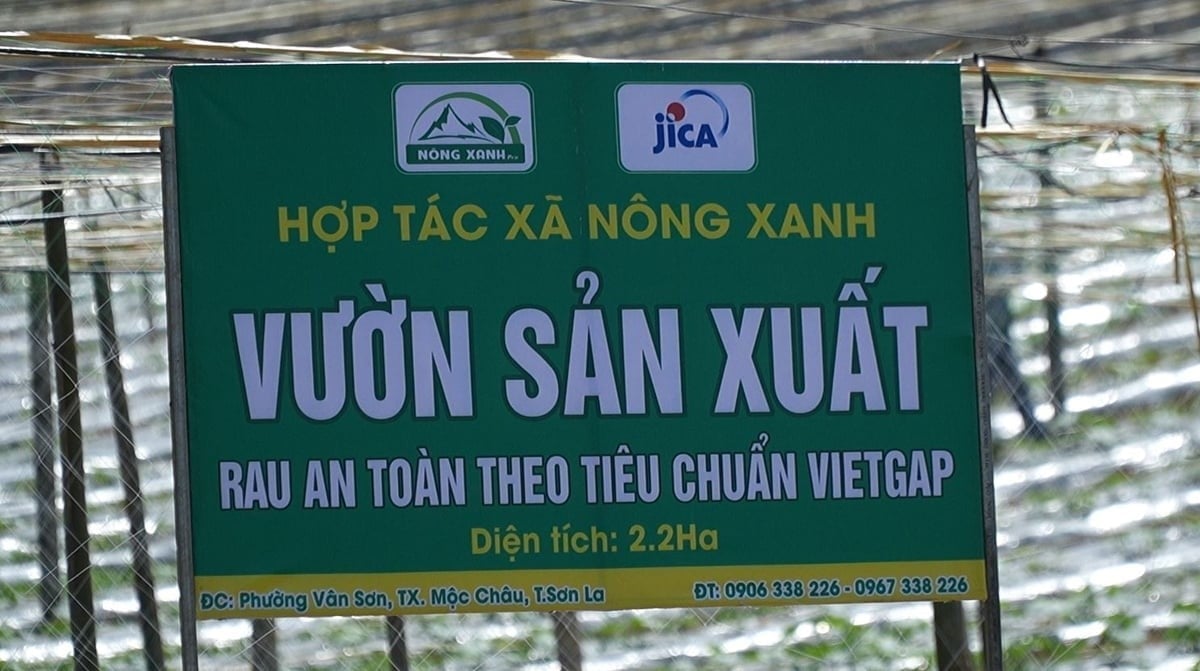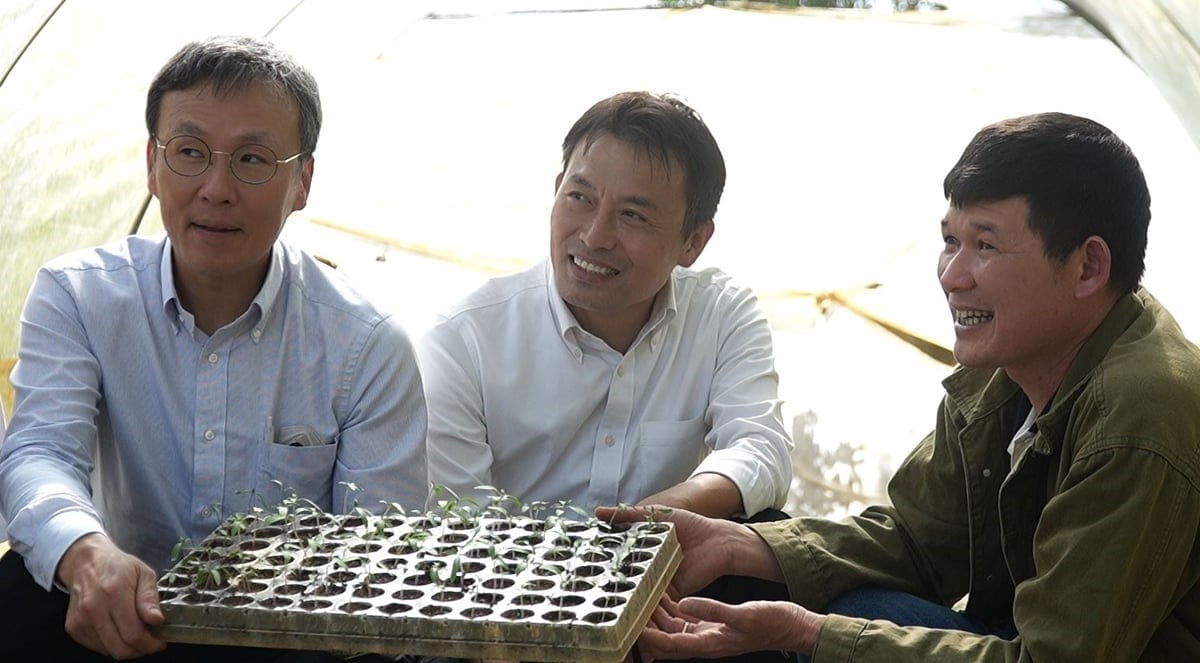November 8, 2025 | 11:12 GMT +7
November 8, 2025 | 11:12 GMT +7
Hotline: 0913.378.918
November 8, 2025 | 11:12 GMT +7
Hotline: 0913.378.918
For many years, Son La province has become a bright spot in attracting and promoting the effectiveness of international projects supporting farmers in agricultural development. Among the most notable is the Food and Agriculture Organization of the United Nations (FAO) with the "Smart Agriculture for the Next Generation" project.
The project has supported 34 households in Moc Chau in upgrading and optimizing more than 35,000 m² of net houses and greenhouses. Most recently, the Japan International Cooperation Agency (JICA) has also brought in the "Strengthening Safe Crop Value Chains in Northern Vietnam" project.

Mr. Kayano Naoki, JICA expert and direct coordinator of the "Strengthening Safe Crop Value Chains in Northern Vietnam" project. Photo: Duc Binh.
Each project delivers distinct values, creating change from farmers' mindsets to production methods. The Vietnam Agriculture and Nature Newspaper had an exchange with Mr. Kayano Naoki, JICA expert and direct coordinator of the project, to better understand the feelings of international agricultural specialists upon arriving in Moc Chau and the directions they set out for sustainable agricultural development.
Sharing about the project's implementation journey, Mr. Kayano Naoki stated, "At the beginning, we faced difficulties in persuading partners and farmers to accept the project's approach, since this was a technical cooperation project rather than one that provided equipment or infrastructure." Indeed, changing long-established practices is never easy.
In the initial phase, JICA persistently accompanied partners in Son La, particularly the Son La Agricultural Extension Center and key cooperatives that hold significant influence over farming households. A wide range of practical activities were carried out, including technical training for extension officers, hands-on training for farmers, forums and workshops to connect stakeholders along the value chain, as well as field trips for experiential learning.

Son La farmers have been proactive in receiving and swiftly applying advanced cultivation techniques supported by international projects. Photo: Duc Binh.
Through this process, farmers gradually understood that the projects not only provided them with new knowledge but also helped them clearly identify long-term development drivers while building mutually beneficial partnerships with enterprises and markets.
In Moc Chau, Mr. Luu Tung Dinh’s Nong Xanh Cooperative was selected as a pilot on an area of 2.2 hectares, with the main focus placed on soil improvement under the motto "What is taken from the soil must be returned to the soil."
At the project's closing ceremony, Mr. Dinh shared, "In the past, farmers cultivated vegetables according to traditional methods, lacking experience, applying fertilizers improperly, and not using mulching, which led to pest infestations and hardened soil. Since participating in the project, with seed selection and the application of mulching techniques, crop yields have increased by 20–25%, and the quality of produce has become more flavorful, meeting the high standards of supermarkets and vegetarian restaurants. Each hectare now generates profits of VND 200–300 million, farmers' livelihoods are improving, and farming areas are expanding."

The safe vegetable production model in Moc Chau is supported by JICA. Photo: Duc Binh.
A key highlight of the project in Son La has been raising farmers' awareness of market surveys. In the past, farmers often relied on experience to produce and sell their products passively. Now, they have proactively studied demand, quality requirements, and pricing to develop production plans. This change has helped cooperatives make more effective decisions, reduce risks, and enhance product value.
Notably, even after suffering heavy losses from Typhoon Yagi in September 2024, many Son La farmers actively participated in training courses on post-disaster production recovery, applying new farming techniques based on JICA's methods. As a result, households were able to restore production within just one to two months.
A distinctive feature of JICA's project is the application of the SHEP (Smallholder Horticulture Empowerment & Promotion) approach, which empowers and promotes horticulture among small-scale farmer households. Initiated by JICA in Kenya, this approach aims to shift farmers' mindset from "grow then sell" to "grow to sell."

For Mr. Kayano Naoki (center), his time working in Moc Chau was particularly memorable thanks to the enthusiasm and eagerness to learn shown by local farmers. Photo: Duc Binh.
The approach is built on four core steps: selecting target farmers and clearly communicating objectives; helping farmers self-assess their situation through surveys and market studies; supporting them in making appropriate production decisions; and providing technical solutions to enhance efficiency.
In many countries, SHEP has proven its effectiveness. For example, in Nepal, farmers' net incomes increased by 50%. In Ethiopia, average income rose 2.7 times. In Malawi, the MA-SHEP project helped farmers improve their lives, increase incomes, reduce poverty, and strengthen resilience against natural disasters.
By bringing this method to Son La, JICA has helped farmers fundamentally transform their production mindset. They no longer grow vegetables and fruits based on habits or movements but instead proactively study market demand to decide what to grow, in what quantities, and at what quality. As a result, Son La's agricultural products now not only meet safety standards but also meet the needs of consumers and purchasing enterprises.
According to Mr. Kayano Naoki, to assess the project's outcomes, JICA has developed a set of criteria covering relevance, coherence, effectiveness, efficiency, impact, and sustainability. Indicators such as gross profits, sales channels, and the participation level of cooperatives have all been surveyed this year—the final year of the project. These results will serve as an important basis for measuring success and create the premise for replicating the model in other localities.
Translated by Thu Huyen

(VAN) Vinh Long is applicating IoT and AI in agriculture to enhance productivity, reduce costs, increase farmers’ incomes toward modern and sustainable production.
/2025/11/07/0913-0-160253_450.jpg)
(VAN) Minister Tran Duc Thang called on FDI enterprises to strengthen linkages, promote green growth, and share benefits with Viet Nam.

(VAN) Vinamilk makes a notable impression at the Asian Technology Excellence Awards 2025 with two pioneering technologies in milk production.

(VAN) Vinachem reviews its 2021–2025 science, technology, and digital transformation progress, and share its vision for the 2026 - 2030 period.

(VAN) Scientists and policymakers say biotechnology, digital transformation, and organic farming are key to helping Vietnam’s coconut industry adapt to climate change and enhance sustainable export value.

(VAN) Combined with fierce competition from other coconut-producing countries and limited adoption of modern techniques, the Mekong Delta’s coconut sector faces an urgent need for transformation.
/2025/11/05/3030-3-092207_368.jpg)
(VAN) Can Tho has advantages to become the regional hub for diversified fisheries development, gradually establishing a sustainable value chain linked to deep processing and export.